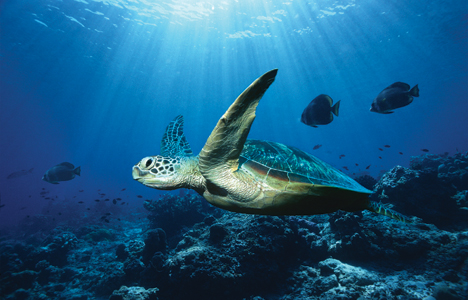
Don’t turn away just yet because of the title! I promise I have something relatively interesting to tell you about. I understand many people are tired of hearing about global warming, but I hate to break it to ya, this junk ain’t just going away. I won’t lecture you too much on what should be done, but I do want to provide you with a little information about it. My info came from this super scientific-y article from Current Biology entitled Impacts of Climate Change on Marine Organisms and Ecosystems. I’ll let you know how to access this scholarly journal at the bottom, but let me warn you its not so fun to read. I’ll do my best to save you the trouble and try to summarize it here.
Believe it or not, life under the sea is much more pertinent to yours than you think. Life forms in the ocean actually make huge contributions to planetary function. They cycle carbon, nitrogen, and other key elements. If those chemistry terms mean nothing to you, essentially it means they keep the atmosphere in check. Bottom line: you don’t want to mess up what these guys are doing. Yet you are! Silly little humans, always messin’ with the world. The oceans are also huge reservoirs for nutrients and gases. Ocean currents redistribute heat around the planet. So basically, oceans make the world go ‘round and keep all the different climates in check and the way they need to be.
Apparently we cause global warming, and global warming is bullying those helpful organisms in the big blue. It increases ocean temperature and acidity levels. These changes definitely aren’t good for the current ecosystems that thrive in the environment they are already adapted to. How would you feel if someone dropped you in a bucket of acid when you are so used to just regular ol’ water? I’ll tell you how: not so good. Ouch. As carbon dioxide levels increase, so do the acidity levels in the ocean. Those fish scales aren’t that thick. As you know, almost everything we do realizes CO2 into the atmosphere. Some other direct consequences of major CO2 emissions are increasing global temperature, construed weather patterns, and rising sea levels along with the acidifying of oceans which I’ve already talked about.
As for temperature, as it increases the oxygen levels decrease. Ocean ecosystems NEED oxygen in order to survive. Actually, almost everything does. I don’t care if you are Superman, you’re gunna need a little O2 every once in awhile. Rising temps also melt those giant glaciers up near Santa, leaving the current coastal communities ruined by an increase in water level. I come from Wilmington, so lord knows I’ve been on enough informative field trips about estuaries and sounds. They are the areas between fresh and salt water and sort of serve as the ocean’s nursery. These environments are quite fragile and any change in sea level could throw the entire ocean out of whack. Scientists project that if carbon emissions are not reduced, the global temperature could rise as much as 5.5 degrees Celsius in the next hundred years. This would cause many species to go extinct, and as I said in the first paragraph, they are vital to cycling all the gases in the atmosphere.
Despite the disappointing options for direct intervention, scientists do have one win on their side. The improvement of scientific ocean models has made it increasingly easier to predict physical changes in the ocean. Knowledge=the power to change and make a difference when it comes to science. Scientists are still working to move beyond prediction to actually stopping degradation of the marine ecosystems. But they can’t do it on their own!
Now comes the obligatory lecture. You may exit out if you please, I understand we’ve all heard it before. I won’t break out the High School Musical and say something cheesy like “we’re all in this together!” (yes, it has been done), but I will say that everyone does need to do something to make a difference. There is a possibility it may be too late to undo these negative effects on the earth’s oceans. These changes in the ocean could have major consequences on the planet and us. As scientists continue to work on strategies for improvement, there are a number of things we can do in our everyday lives. Most of us own at least one environmentally friendly item, either something as small as a reusable Target shopping bag, or as large as a hybrid car. Keep it up! Use ‘em! I could describe all the different options, but you know what to do. Reduce, Reuse, Recycle. So the bottom line of this article is that the oceans could, in fact, be helpful in our climate change plight. All we have to do now is make sure we don’t destroy the oceans before they can make a difference.
To view the actual article, go to this link and then click the PDF option.
No comments:
Post a Comment